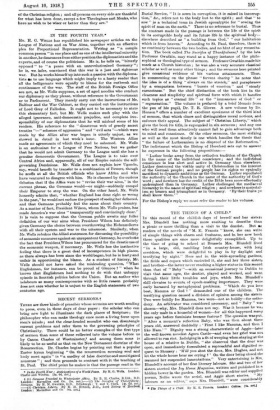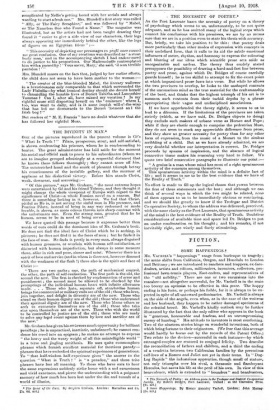THE THINGS OF A CHILD.*
IN this record of the childish days of herself and her sisters Mrs. Blundell has nothing more exciting to describe than a picnic or more thrilling than a visit to the dentist. But as readers of the novels of "M. E. Francis "know, she can write of simple things with charm and freshness, and in her new book those qualities are once more delightfully exemplified. Up to the time of going to school at Brussels Mrs. Blundell lived "in a large, old, rambling Irish country-house, with long corridors, which were delightful to play in by daylight and terrifying by night." Here and in the wide-spreading gardens, the fields and copses which encircled it, she and her three sisters and brother—the latter never reaching a higher status in this record than that of "Baby "—with an occasional journey to Dublin to visit that same ogre, the dentist, played and worked, and went through their little troubles and joys, which Mrs. Blundell's skill elevates to evente of epoch-meldng importance. They were early harassed by metaphysical problems. "Which do you love best, Mamma or God ? " demanded one of the children. The terrifying question caused a division of opinion among the sisters. Two were boldly for Mamma, two were—not so boldly—for ortho- doxy. An arbitrator was considered necessary, and " Baby " was chosen—why, Mrs. Blundell does not say. Was it because he was the only male in a houseful of women—for all this happened many years ago before feminists became furious ? The question wasput. "After a moment's reflection Baby, who was then about three years old, answered decidedly : First I like Mamma, and then I like Ham.'" Dignity was a strong characteristic of Aggie—later the well-known novelist Agnes Castle—and even her grief was not allowed to rem riot. Indulging in a fit of weeping when staying at the house of a relative in Dublin, "she observed that the door was open, and immediately formulated a reproachful and dignified re- quest to Shuzzey Will you shut the door, Mrs. Hughes, and not let the whole house hear me crying ? ' On the door being closed she resumed her suspended lamentations." Very entertaining is Mrs. Blimdell's account of her first literary labours. She and two of her sisters started the ivy Home Magazine, written and published in a hidden bower in the garden. Mrs. Blundell was editor and eupplied poems, Nellie wrote the serial, and Aggie short stories. "MY labours as an editor," says Mrs. Blundell, "were considerably .0 The Things of a Child. By H. B. Francis. London: MC/
complicated by Nellie's getting bored with her serials and always wanting to start afresh one." Mrs. Blundell's first story was called "Ally, or The Fairy Seraphine," and was followed by "Mabel, or The Nameless One who Found a Name." The magazine was illustrated, but as the artists had not been taught drawing they found it "easier to give a side view of our characters, their legs always appearing one immediately behind the other, like the legs of figures on an Egyptian frieze" "This necessity of depicting our personages en profit once caused me great confusion. One of my creations was described as a stout burly man,' and in the accompanying sketch I had endeavoured to do justice to his proportions. Our Mademoiselle contemplated him with a pursed lip ! Vous savez, Mary,' she said, 'ii a un terrible pantalon ! ' ' Mrs. Blundell muses on the fact that, judged by her earlier efforts, the child does not seem to have been mother to the woman :—
" The creator of the blue-blooded Mabel, the literary wallower in a luxuriousness only comparable to that which surrounded the Lady Flabella—by what ironical destiny should she devote herself to chronicling the humble lives of Dorset Tabitha and Lancashire Ttunrnas 7 Can I, after all, have missed my vocation ? Is my rightful muse still disporting herself on the 'eminence' where I, too, was wont to dally, and is it some impish will-o'-the-wisp that has led me downwards to the Dorset 'lotment alai the Irish bog ? "
But readers of "M. E. Francis" have no doubt whatever that she has followed her rightful Muse.



































 Previous page
Previous page